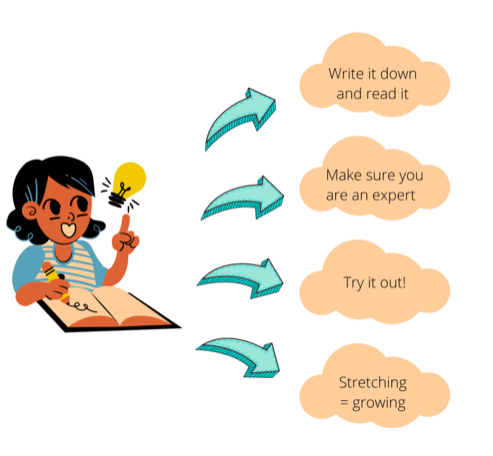Module 4
TRAINING OF VOLUNTEERS
How to pass on skills to others? Training of volunteers
Introduction
The development of migrant women is not only about personal development. It is also the ability to pass on one's own experience to others, to support women who are in a similar situation or who are just starting to live in a new country.
This module provides information on why adequate training is crucial, especially whent it is followed by the relevant diagnosis of migrant womens’ needs and expectations. The module is also about the ways of passing on the knowledge and skills to mentees. This section will show a clear picture of training of volunteers, thus bringing female migrants closer to this concept and encouraging them to seek any training opportunities.
Objectives
- To become familiar with training opportunities that can be offered to migrant women and their families by institutional networks.
- To fully understand how to pass on skills and knowledge to mentees.
- To recognise one’s own needs and expectations in terms of seeking any training opportunities.
- To understand what a training of volunteers is characterised by.
Duration & Requirements
Approximate reading time for the module, without taking the indicated resources into consideration, is about 3 hours.
The learners don’t need to have any particular knowledge or skills. The learners will need a computer with an internet connection and sheet of paper and a pen to take notes.
It is advisable that the learners have an insight into the reference material and delve into the information provided.
Content
Through volunteer training, the volunteers get a sense of self-confidence because they are able to believe in themselves and their ability to succeed in their volunteering mission. The confidence that comes as a result of the training plays a big role in improving their satisfaction with the work they have done, and it subsequently leads to the growth and success of any organization.
Volunteer training provides an opportunity for volunteers to be assessed on how well they are doing in their missions and how they reach the objectives that were put in place for them during the training process. Volunteers’ participation in any training session gives them a sense of value as this experience allows them to share useful information, gives them a sense of self-fulfillment, and as a consequence, the potential volunteers put in more effort and commitment in their different volunteering roles.
Volunteer training creates an environment that enables the volunteers to learn about the culture of where they are staying, what the people love, how to be patient with them among others. Once they are familiar with this, the communities become more receptive towards those volunteering among them. Furthermore, a sense of harmony between the volunteers and the locals facilitates a quite sophisticated process of integration of migrant families into the society.
Among the families with migrant backgrounds there can be some volunteers excelling at peer support that promotes pride, satisfaction and feeling some kind of commonality with another person. Migrant-women-led peer-to-peer activities may advocate for the rights, freedoms and dignity of migrant, refugee or ethnic minority women and girls in Europe. Such activities offer vulnerable people the opportunity to give back to their community, develop a sense of purpose and a greater sense of identity.
How to pass on skills to others?
Training opportunities
Women are primarily considered in terms of their vulnerability, even though highly-skilled women actually have higher rates of migration than both low-skilled women and highly-skilled men. Stereotypes in Member States reduce migrant women to the role of "passive wife" or "mother" and result in integration initiatives for women centring around family management.
The practices on the ground show that a tailored approach can include the provision of free childcare during language classes, or mentoring by other migrant women. Indeed, many education and training initiatives are led by women with a migrant background.
There are a lot of institutions and organisations that offer various kinds of training to migrant women to raise their qualifications, improve their situation in the labour market and facilitate their commonplace existence and adaptation to a new reality.
Here are some examples of the proposed trainings:

The topical training usually lasts around two months and gathers up to 10 participants in each group. Each training brings some quantitative impact:
- development of technical and professional skills (depending on the field);
- greater understanding (of) and adaptation to the given culture;
- marked improvement in economic conditions;
- more specialised care at home and a higher quality of life for elderly patients.
As a result, if a given woman is willing and ready to form peer support groups, they can pass the knowledge and skills acquired in the course of the given training.
Passing on skills and knowledge
Passing on skills or knowledge is not an easy task. There are a lot of well-educated people who are not able to accessibly and effectively pass on their specific knowledge to others. First of all, this mission requires full engagement of a team leader/ trainer, some specific skills closely correlated to adequate personality traits including some clout, and a proper approach to mentees or trainees.
In order to do it well and invitingly, here are a couple of relevant tips:
1. Write it down and read it – Writing down what you want to say is a key element here. Writing words down gets the trainees out of your head and helps you structure what’s in your mind. This also allows you to review it and fine-tune.

2. Make sure you are an expert – Now, maybe not an expert, but at least you had better be well-read or perceived so, at least on a base level. Don’t go preaching to your team about a topic you are not into. This will make you lose credibility and the trainees will shut off.
3. Try it out! – Throw ideas and quick quotes you have analysed or read before to see the trainees’ reaction. Sometimes it is worth avoiding some major embarrassment in front of thousands, just with trying things out. Everything that is on the table during your training should pass through many hands before because there is always something we can improve.
4. Stretching = growing – Many people are worried about stretching people during this time of the pandemic. People probably have more time on their hands now than ever. They are stuck at home and you, literally, have a captive audience. You as a leader and your team leaders as followers should conduct a training at least once a week, especially when thinking about hermetic communities and peer support. Pour knowledge into the trainees’ heads and your followers as peculiar Peer-To-Peer Ambassadors can do that in turn for their communities. In this context stretching means growing then.
Additionally, you should pay attention to:
- CULTURE
Skill sets can be trained but culture must be caught not taught. If you have someone dedicated to the culture, you know that they believe in what you are doing. Someone who has genuine belief in what they do, can inspire a team at the crunch time (critical moment) and leaves some room for creativity.
Ask yourself a question: Is your culture healthy? Can your people summarize your culture in one sentence?
- CONSISTENCY
Consistency must be built over time and can be seen very clearly. Someone consistent, aspiring to be your follower, will be an anchor for you. Knowing you can give a task to them with a deadline and that they will get it done is a huge relief. If your team lacks consistency, don’t worry and try to show the trainees how to do it and what you expect.
- GIVE YOUR TRAINEES AUTONOMY
Micromanaging is almost never a good idea. It often smothers creative minds and makes the atmosphere tense. Instead, give clear parameters as to what is expected. If they are given this they know the vision and direction. Give them space to deviate from the plan. A team with your culture will know that they can express themselves if it means an even better idea.
Recognition of one’s own needs and expectations to search for adequate training sessions
When migrant women reside in a foreign country and they are going to stay there for a longer period of time, they should definitely determine their training and development needs which fall into one of the three categories:
- improving general knowledge including language and culture of the country they are residing in/ raising vocational qualifications,
- broadly understood job-related needs,
- personal development.
Additionally, they should spot some gaps (regarding their own skills or knowledge) and set some goals, even in the long run, but it will surely help them follow a certain development schedule.
The diagnosis of training needs helps to identify the discrepancies between the knowledge held by potential trainees and the knowledge, which is desirable for some specific reasons, defined by the trainee themselves. Training needs analysis is an attempt to specify who should be trained and to which extent, in order to achieve the desirable status of knowledge, skills and ways of acting, therefore it is so crucial for further development of competencies and more integrated existence within a given community.
Training of volunteers
While attracting volunteers to your organization or helping migrant women to become volunteers can be challenging, it is well worth the time and effort. The key to being successful once you engage a volunteer is providing volunteers with training to empower them to succeed. Training makes volunteers feel welcome, gives them confidence and equips them with the skills they need to be an effective part of your team or their community.
What will you teach volunteers?
When first deciding on the content it is helpful to start with these questions:
- What is the purpose (why) of training volunteers?
- When volunteers finish training, what will they know or be able to do?
- What do your volunteers want to know/expect to learn?
An effective training program needs to be beneficial to both your organization and your volunteers, so design it to meet the goals of your organization, as well as the goals of volunteers themselves.
Comprehensive and useful training programs should, at a minimum, cover the following four aspects:

- What to Do - What is expected of your volunteers and what will their responsibilities be?
- How to Do It - More than just giving volunteers a quick list of their responsibilities, provide them with a detailed explanation and, step-by-step instructions on how to accomplish their tasks. If their specific responsibilities aren't clearly laid out, they won't be able to perform their duties well and, worse, can unintentionally create problems.
- What Not to Do - Be clear about what types of tasks volunteers aren't allowed to do. Ensuring that volunteers are clear about the limits and boundaries that exist within your organization can avoid issues in the future.
- What to Do in an Emergency - It's critical for volunteers to know information such as where the first aid kits are located, what they should do in case of a fire and who to get if back-up help is needed. Even if it is a peer support volunteering service, any congregations take place in closed spaces mostly, so such knowledge is vital.
There may be much more that you need to include in your training program - and different depths of training may be required for different levels and needs/ expectations of volunteers - but these four basic areas should be included in any volunteer training.
How will you teach volunteers?
Just as in deciding what you will teach volunteers, figuring out how you will teach volunteers will depend greatly on your organization and the skill level required for the volunteer role. Below are two general suggestions, one for smaller organizations and one for larger organizations.
- Options for Smaller Organizations
Smaller-sized organizations and groups without the resources to incorporate a full training program will usually benefit from keeping their methods of training volunteers simple. Two possibilities include:
- Using a Buddy System or Shadowing – New volunteers are initially trained by working with an experienced person. The experienced person can show them how to do things, answer their questions and offer suggestions and advice.
- Orientation – A detailed orientation for volunteers should include:
* a description of the history and purpose or your organization
* clear explanation or all policies and procedures related to volunteering
* any all specifics related to the volunteers role
These are also good possibilities if the tasks volunteers will be responsible for are straightforward.
- Options for Larger Organizations
For larger organizations and larger groups with more resources, as well when volunteer work is more involved and challenging, a more extensive training plan will typically be necessary. Whether the training can be done in a few hours or needs to be done over an extended period of time will be determined by the amount of material that needs to be covered, and the resources you have available to provide the training. If you have a Volunteer Director or Volunteer Manager, this person will often handle the entire training, or will be involved in some aspect of the training.
Peer support volunteering vs. integration of migrant women
- Form a group
Pull together a group of at least 5 women with migrant background or ethnic minority that have a high level of interest in volunteering. The combination of a group of interested volunteers and being able to communicate how volunteering will affect your organisation will make a strong selling point, increasing your chances of getting a volunteer program approved within your organization, even in the far future.
- Present ideas
Discuss a volunteer program for migrant women and arrange an in-person meeting to listen to the initiators who will come up with their ideas on what kind of activities they would like to lead. Try to be supportive and during the meeting recognize any needs and expectations of a peer support group. Help the volunteers and Peer-To-Peer awareness Ambassadors with any marketing services and involvement of more migrant women in volunteer programs. Present them the benefits from this kind of program.
- Have a transparent system
Have the right system in place to stay organized and ensure everything runs smoothly. List all responsibilities, tasks and commitments of your organisation and peer support groups.
- Recruit and engage peer support volunteers
Try to provide a variety of resources that enable your organisation to support your peer support volunteers. Come up with attractive ideas that will engage migrant women or young girls to become volunteers e.g. using their talents or skills – thus they will have a strong sense of usefulness and appurtenance to the community of volunteers. Stay in constant touch with the representatives of this group, keep them informed about different events. You can create newsletters, press release templates, posters, flyers, Volunteer Badges and anything that will trigger on migrant women’s volunteer activity, which undoubtedly affects the holistic process of their integration into the society.
Learning Outcomes
By the end of this module you will be able to:
- know the subjects/ topics of trainings most frequently offered to migrants, refugees or people from ethnic minorities,
- know how to pass on skills and knowledge effectively,
- know how to determine one’s own goals, needs and expectations in terms of training opportunities,
- know what and how volunteers are taught,
- understand how an organisation can succour peer support groups and thus facilitate the process of integration.
Summary
In this module we discussed the potential training opportunities for migrants and how the training of volunteers should be comprehensively conducted, also with regards to peer support groups underpinned by dedicated organisations. We highlighted the features characteristic of effective transfer of knowledge and skills.
We recommend that you consult the information included in this module, as it will be relevant to your training on this topic, or keep this guide as a resource for other activities or your personal inspiration.
Self-assessment
Suggested resources
- Centre for International Voluntary Service
https://www.civskenya.org/about-us/our-blog/163-importance-of-volunteering
- European Network of Migrant Women
- European Institute for Gender Equality
https://eige.europa.eu/news/education-and-training-migrant-women-what-works
- https://ec.europa.eu/migrant-integration/integration-practice/project-gericuidar-training-migrant-women-caring-elderly_en
- Training Needs Analysis and National Training Strategies, Council of Europe
https://rm.coe.int/tna-and-nts-training-needs-analysis-and-national-training-strategies-h/1680746e54
